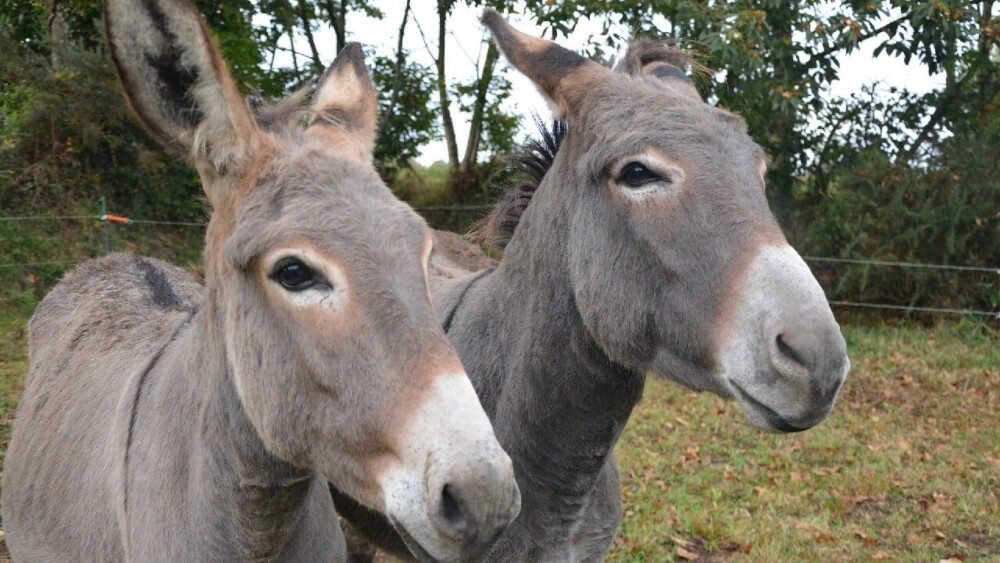Not long ago I researched the cost of a donkey before purchasing my own. I found numerous articles online that said that donkeys are inexpensive animals. Writers compared them to horses and said that because donkeys do not require as many visits from the vet or farrier, they are inexpensive to keep. While that is partially true, it is also very misleading.
How much does it cost to purchase and maintain a donkey? Most donkeys require a significant investment in both time and money. Their purchase cost can vary from almost free to over $5000 depending on numerous factors. Their annual maintenance costs will range from $1000 to over $2500. And there are other costs as well.
If you are looking to buy a donkey, I’m going to outline all the costs of buying and owning donkeys that no one else is talking about!
The Costs of A Bonded Donkey Pair
Keep in mind that many donkeys are part of a bonded pair and sold as such. You may have to purchase two together and multiply many of your costs by two.
Even if you do not buy a bonded pair, your donkey will be happier if you have a donkey pal for him or her. An unhappy donkey can have additional health issues. But, a pair of donkeys will considerably increase your annual cost.
In addition to the purchase and annual maintenance costs such as feed, vet, and farrier fees, you may incur additional expenses, like fencing, grass or pasture upkeep, barn, and implements. So unless you already have all of that in place, you could easily pay several thousand dollars to build fencing, housing, and outfit a barn for your new donkeys.
In this article, I’ll break down the expenses of purchasing and maintaining a donkey. I hope I can help you to avoid the sticker shock my husband and I experienced when we realized the annual cost of our donkeys after a couple of years.
The Cost of Purchasing a Donkey
Let’s start with the cost of the donkey itself. Unlike the cost of hay or most consumables, you can choose the price range of the donkey you eventually purchase.
The cost of donkeys depends primarily on these eight variables:
- Size
- Age
- Colorings and markings
- Gender
- Breeding and conformation to standards
- Training
- The organization from which you buy it
- The region of the country where you purchase your donkey
We’ll briefly consider each of those qualities and discuss how they affect the cost of your donkey.
Donkey Size Influences Price
There are three sizes of donkeys: miniature, standard, and mammoth.
Miniature donkeys are required to measure under 36” or nine hands at the withers when fully grown. Some mini donkeys are bred to be much smaller than that, and some people are willing to pay more money for the smaller miniature donkeys. So if you want a very small mini donkey, be prepared to pay accordingly.
Because the price of donkeys varies throughout the United States (more on that later), my charts break down the average price of the donkeys by region. These regions are flexible, as it was sometimes challenging to find several donkeys for sale in a particular area, so I expanded my search at times. This was especially true in lower population states such as Utah, Nevada, and Nebraska.
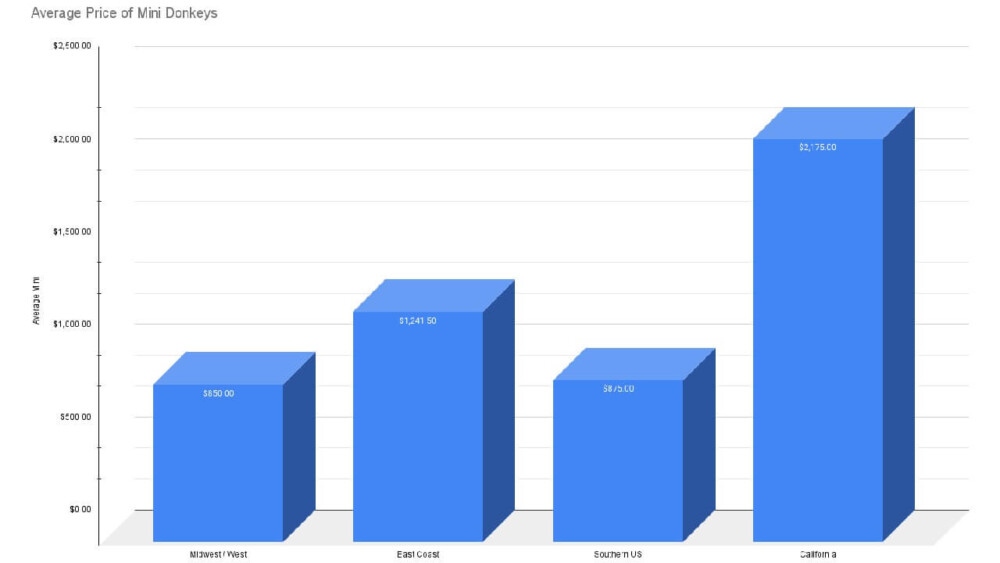
Standard donkeys range from 36” to 48” or from nine to fifteen hands in size. Standard is further broken down to small and large standard. Interestingly, standard donkeys are often less expensive than miniature donkeys. This may be due to the fact that people buy mini donkeys for the cute factor, so they’re willing to spend more on them.
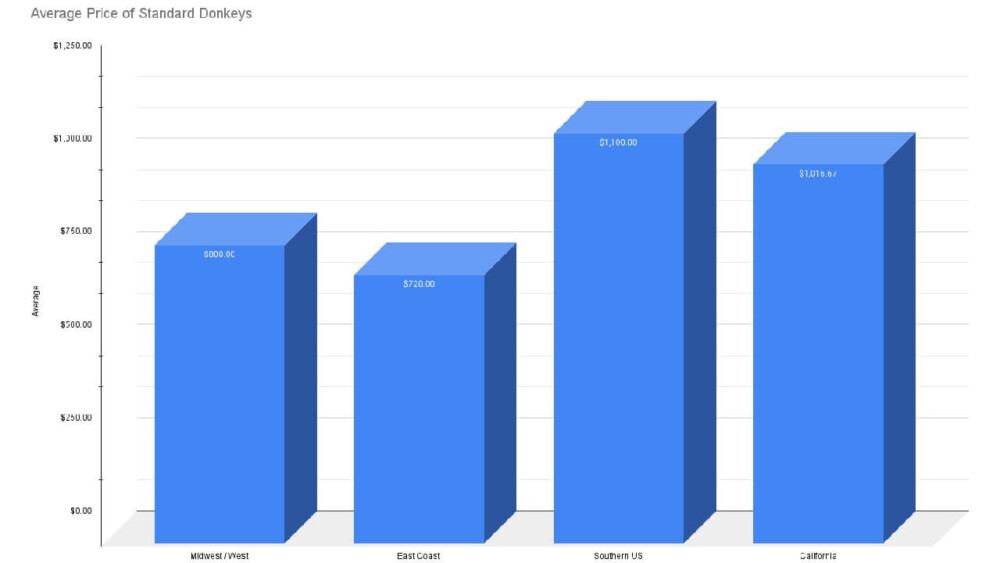
Finally, the mammoth donkey or American Standard Jackstock is gargantuan. Jacks start at 56.01” and jennys at 54.01”. These giants are rare and the most expensive donkeys. The jacks are rarely gelded since there is a demand for breeding. They are considered an investment for experienced donkey owners.
I found no mammoth donkeys for sale on the Craigslist postings I scoured. I used the Equine Now search engine and found those listed below. Each of the bars represents the price of one mammoth donkey. I included the states in which they were located. This provides you with a visual of the wide but pricey range of these donkeys.
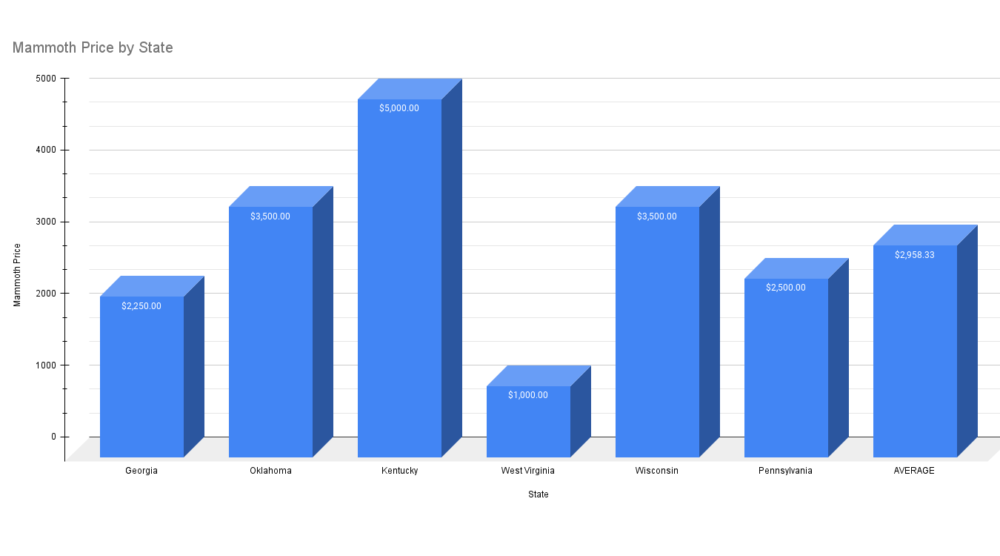
In addition to size, what you pay for a donkey will be affected by these variables:
Age Affects Cost of Donkeys
People love baby animals. There’s nothing cuter than the disproportionately long ears and legs of a donkey foal. And the huge eyes full of baby animal trust are irresistible.
In addition, when you purchase a foal, you can do the exact type of training that you want and you don’t have to worry about it arriving with bad habits from a previous home.
Because of all those factors, you may pay more for a donkey foal than for an adult. On the other end of the spectrum, you can expect to pay less for an older adult donkey. An exception might be an older donkey that is especially well trained or has other desirable traits.
Colorings and Markings Affect Demand
While this is purely aesthetic consideration, donkeys with attractive and unique colorings and patterns are often priced higher than the standard gray or brown coats. The most unique donkey color is pure white, and these are quite costly if you are fortunate enough to find one for sale.
Gender Affects Price
Intact male donkeys are called jacks. Females are called jennets or jennys. Castrated males are called johns. Most jennys are more expensive than jacks, as jennys can be bred to supply you with more little donkeys on your farm.
The exception is a breeding jack that has outstanding qualities and a track record of passing the traits to their foals. Those jacks will fetch a pretty penny. Johns are the least expensive, as they are only used as pets and companion animals. But they make great pets!
Breeding and Conformation Price Variances
If you are interested in show donkeys, you will want to learn donkey show standards and seek them in the donkey you purchase. You will find these qualities most readily in a donkey you buy from a breeder who breeds toward the standards. These donkeys are more expensive due to the breeders’ efforts.
Show quality donkeys can cost $3,000-10,000 extra, depending on pedigree and awards won by the donkey or it’s parents.
Training Increases Donkey Value
Donkey basic training includes lifting its feet for a farrier, haltering, and leading. It takes time and patience to train even these actions. It is also convenient to have a donkey that will load into a trailer, which takes additional training. Finally, some donkeys pull carts and accept riders. Well-trained donkeys cost more than untrained donkeys.
Please keep in mind that if you buy a foal, you will either have to put in the time and effort to train it yourself, end up with an untrained, hooligan donkey, or pay a trainer. The cost of the trainer will likely range from $35 an hour and upwards. And donkey training is not a quick process, so it is costly to pay a trainer.
It takes 4-6 hours a week and can take a year or more to train a donkey. That’s roughly $7,250 a year (based on 4 hours a week).
The Organization From Which You Buy Your Donkey
There are many options for people who want to buy donkeys. Reputable donkey breeders are the most costly option, but you are also most likely to get a donkey that has been well cared for and who is up to date on its vet and farrier services. They have likely been exposed to some training as well.
On the other end of the spectrum are animal shelters, where donkeys are sometimes available for as low as $100.00. A concern with these animals is the possibility that they were neglected for some time, which may have health consequences. If you are able to assist in your donkey’s convalescence, shelters are a great option for purchase or adoption.
People often search online to purchase a donkey. There are several horse and donkey sites that charge a fee to owners for the advertising. The donkeys advertised there are more likely to cost more than those on a free site such as Craigslist. The pricing I used in this article was mostly taken from Craigslist as a middle-of-the-road price range.
If you adopt a rescued or older donkey, the purchase price is usually waived and you only pay the adoption fees of a couple of hundred dollars.
The Region of the Country
When we rehomed some donkeys about a year ago, someone who was interested in them told us that because we were in Florida, it would be no problem to sell them at a decent price. If, however, we were in Georgia, we would have to practically give them away. Donkey prices change according to where you live.
In my review of Craigslist prices around the country, I found that the two states with the priciest donkeys were California, Ohio, and Texas. Most of the prices in the other regions were in a somewhat similar range.
I did not include the Mammoth Donkeys in my per region calculations because I couldn’t find enough of them for sale in different regions of the country.
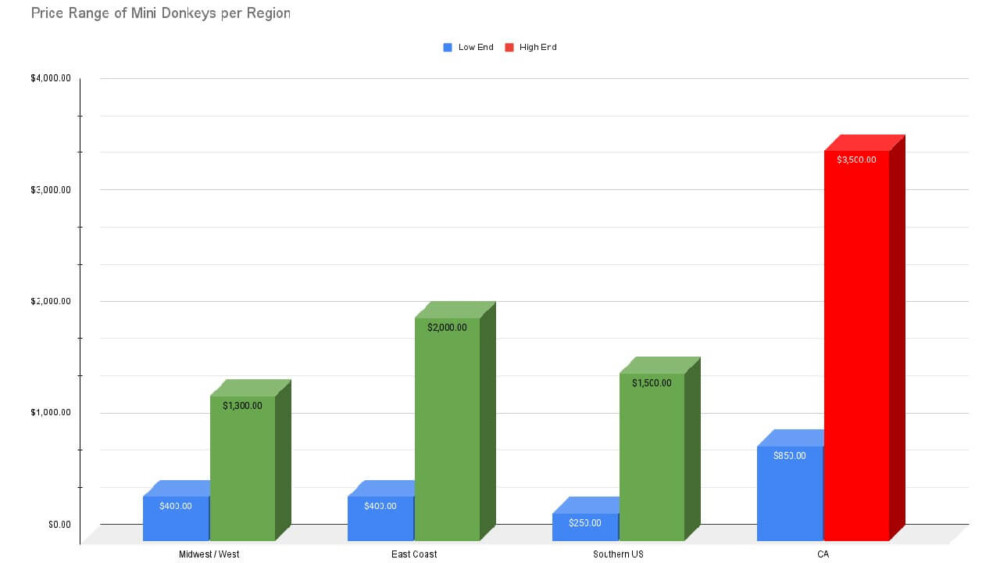
Compare those costs with the high and low costs to purchase a standard-sized donkey by region.
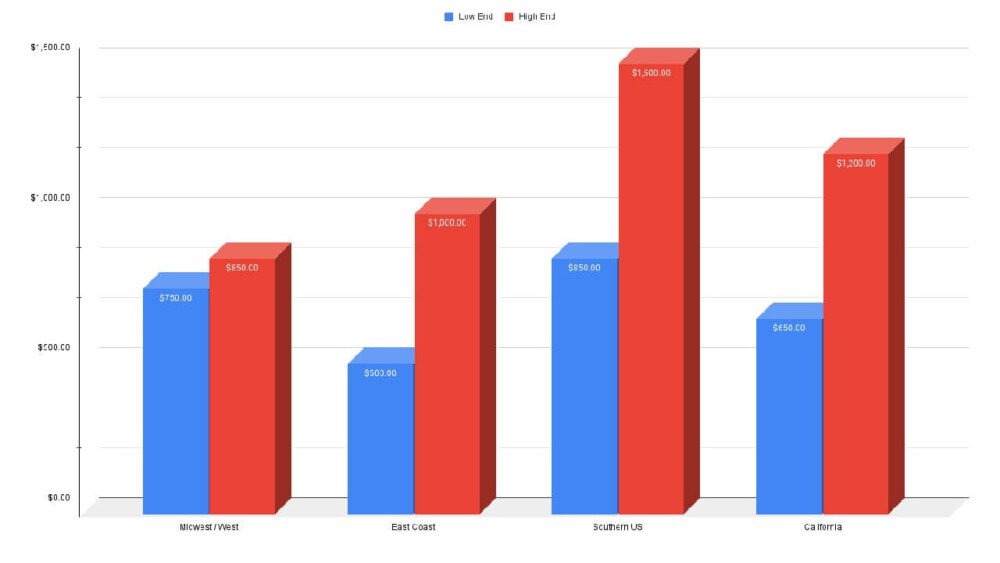
But, the cost to purchase a donkey, is only the beginning of your donkey costs.
The Cost of Consumables
Even if you find a free donkey along the side of the road or you inherit your great-grandma’s prized jennet, you will still incur the costs of owning it. Over the course of a couple of years these costs may surprise you and strain your piggy bank. I included feed costs in and also things like fly spray and ointments that you’ll likely purchase regularly.
Here’s a chart with a list of consumables using prices based on either Tractor Supply or Rural King, since they have standard costs throughout the country. You’ll notice I included both the price for a single purchase and the approximate yearly cost. Please keep in mind that I calculated these with a single donkey in mind and you should have at least two donkeys.
For feed, I used coastal hay (the cheapest) from Tractor Supply and pine shavings as bedding. Some people do not use any bedding at all, and some use more costly bedding. So these costs vary considerably, but this should give you a good sense of what you’re facing.
I did not include a cost for grain, as most donkeys should not be fed grain on a regular basis. They do not digest it well and it leads to overweight donkeys. I also excluded the upkeep of your pasture or grass because it varies so widely depending on where you live. But keep that in mind as a potential additional cost.
| Item | Per Item | Per Year |
| Hay or Straw per bale | $10.49 | $500 |
| Bedding | $6.00 | $400 |
| Fly Spray | $15.00 | $45.00 |
| Salt and Mineral Block | $11.50 | $34.50 |
| Tail and Mane Conditioner | $14.75 | $44.50 |
| Total Annual Cost | $1,0245.00 |
Veterinarian and Farrier Costs
Vet costs, like consumables, vary somewhat by region. You should budget for vet care twice a year. Donkeys should receive rabies shot once a year and a combination vaccine twice a year. The combo vaccine should include East or West Nile Virus, Eastern Equine Encephalitis, and a tetanus booster. These shots cost between $15 to $60 apiece.
| Care Needed | Cost | Frequency | Total Cost |
| Rabies Shot | $15-25 | Annually | $15-25 (inc vet) |
| Combination | $35-60 | Semi-Annually | $70-120 (inc vet) |
| Flu Shot (Optional) | $15-20 | Annually | $15-20 |
| Fecal Egg Count | $10-15 | Annually | $10-15 |
| Dewormer | $30 | Annually | $30 |
| Vet Visits | $110 | Semi-Annually | $220 |
| Castration | $350-400 | Once | $350-400 |
| Ferrier | $40 | Six Times Per Year | $240 |
You will also want your vet to run a fecal egg count once a year or so to determine whether your donkeys need a dewormer. The egg count will probably cost between $10 and $15, and the dewormer runs about $30.
Because your vet will likely come to your farm (unless you’re skilled at loading and driving your donkeys to his clinic), you can expect a charge for a house call. Our vet charges $65, though I have heard of some who charge $45.
Our vet visits for our three donkeys average about $330. That’s about $110 per donkey per visit. At twice a year, it’s $220 per year per donkey to cover shots and vaccines and the house call. I used this number in my calculations, though your vet charges may be slightly higher or lower.
Finally, if you ever decide to castrate a jack, you can expect to pay between $350 and $400 for such a procedure.
Farriers also will be regular visitors to your farm. Ours charged about $40 per donkey. That is pretty close to the standard charge. Ideally, you will engage a farrier at least every eight weeks or about six times a year. That will run you another $240 a year.
Paying around $220 per donkey per year for the best vet care and $240 a year for healthy hooves will put you out another $460 a year. As they say, that’s no chump change, especially if you have more than one donkey!
The Cost to Set Up a Barn for a Donkey
This is probably the most variable cost, as you may already have shelter and fencing in place if you own other livestock. But if you do not, setting up a barn for a donkey is an investment. I attempted to create a complete list of barn implements for the new large animal owner. I used Amazon to research the costs, and I chose the middle range of the prices for each item.
You’ll note that there are some items that many people will not need, such as the water trough heater. Living in South Florida, that is something I never had to invest in. But we used lots of fly wraps and spray.
I listed the cost of an equine water trough. You could use buckets or a plastic baby pool if you have only a couple of donkeys. But, if you have cold winters, a water trough is worthwhile.
You could save $8 on feed scoops and use recycled large yogurt containers. And rather than a $150 hay rack, you could use a $30 hay bag. Still, you can expect to pay several hundred dollars for barn setup.
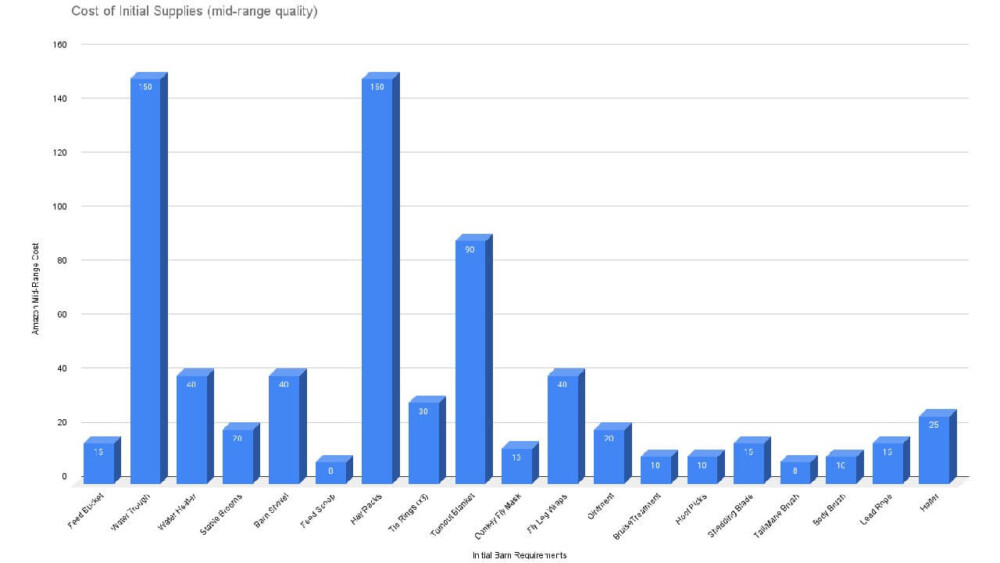
Additional Costs
One additional cost that I did not include because not everyone needs it is transportation. If you do not own a donkey trailer, you may need to pay someone to transport your donkey to your home. If it’s a short distance, this may not cost much. But if it’s a long-distance, expect to pay several hundred dollars.
Another cost that is beyond the scope of this article is the cost of fencing and a lean-to, barn, or shed for your donkey. These are absolute necessities and can be done on a budget or cost you thousands of dollars.
Finally, it is possible to purchase a donkey to board at a commercial stable. These costs, too, vary widely depending on facilities and the level of care required. While I did not find specific sites that board donkeys, the horse boarding facilities I explored charge anywhere from $165 a month up to $600 a month. That would add another $1980 – $7200 a year to your donkey bill.
Costs Not Included in this Article:
- Horse Trailer for Transportation
- Cost to Stable a Donkey
- Barn or Shed for Shelter
Conclusion
I hope this helps you to plan for the costs of a donkey. You may purchase a donkey for just a few hundred dollars, but if you want to maintain it in the best of health and keep its hooves trimmed; if you want to provide it with good feed and a well-supplied barn, you will easily spend an additional $1500 to $2500 per donkey per year. And much more to board it.
Purchasing donkeys is a serious, long-term investment. I wish you the best in your donkey endeavors. Plan well, and don’t underestimate the costs. They add up over the years.
My Favorite Equine Resources For Horses and Donkeys
This list contains affiliate products. Affiliate products do not cost more but helps to support BestFarmAnimals and our goal to provide farm animal owners with accurate and helpful information.
Squeaky Chicken Toy is hilarious to watch and the horses love it! It’s not super tough so keep it away from dogs.
Dewormer with Ivermectin: I use this for my horses and my goats. Duvet makes a great dewormer. I switch between the Ivermectin one and one like this one so the worms don’t get immune to it.
Manna Pro Apple Flavored Nuggets are a delicious smelling treat that my horses go crazy over.
Equinity Amino Acid Supplement for Horses makes a big difference for any horse that’s struggling with arthritis, hoof issues, or just generally. It’s great for older horses who can’t absorb all the nutrients in their food as well!
Manna Pro Weight Accelerator helps older horses gain weight and stay healthier! This was especially helpful when one of my older horses lost weight over the winter and helped her regain her weight over the summer!
Farnam Fly Control goes on the horse or donkey and will keep the flies off your sweet pet. It makes horses way more comfortable and will keep sores from getting infected as well.
Wound Kote protects sores and wounds. It acts as an antiseptic and helps wounds heal faster. It works on both my horses and goats.




